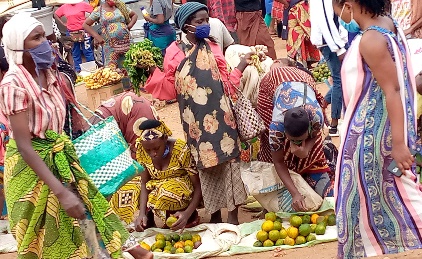Female small business owners affected by COVID-19 appeal for support
Antoinette Mukamusoni’s business was flourishing and expectations were so high until she heard that the market she was operating in was to be closed to mitigate the spread of COVID-19.
She is one of hundreds of women who operated at one of the busiest markets located in Nyabugogo suburb in the area better known as Kwa Mutangana.
The market was closed three weeks ago leaving with no option but to become a street vendor which is a risky business as it is illegal to sell products on the street.
“I became stranded and had nowhere else to take our products, so I opted to become a street hawker,” Mukamutoni told Agasaro Magazine.
She noted that she knows other women who used to do businesses inside the market but are nowhere to be seen, as they fear doing the risky business. Some of them, she says would not be able to come back after the market reopens.
Mukamusoni says women were hit hard by the Coronavirus pandemic especially by the lockdown and other measures put in place by the government to mitigate the spread of the pandemic.
She appeals for the support of women if their businesses are to recover as even those still in the business are struggling after profits have degenerated.
“The lockdown affected our businesses and we have no hope for recovery, we appeal for support be it from the government or other partners, some of women are single mothers and are heads of their own households,” she implored.
“I know some women in different markets who used their capital and could not resume after their lockdown was eased. Now that our market is also closed there is a likelihood that some women will spend their capital and their hope to resume the business is fading,” she added.
Gloriose Uwimana is another woman from the Gikondo sector in Kicukiro District who retails groceries. Before COVID-19, Uwimana always got up around 5 am, took a taxi to Nyabugogo main market to buy the groceries and resold them to her clients.
“Normally, I could sell off all the fruits and vegetables at around 10 am. I could deliver them to my loyal clients depending on their respective orders,” Uwimana said.
Uwimana said thanks to her business, she was able to pay rent, buy food staff and cover school materials for her two children.
For now,Uwimana says it is no longer easy for her to operate because many things have changed including transport which doubled the ticket prices, markets that were closed while the number of clients has reduced.Besides, Uwimana said she now needs around Rwf4,000 to bring the goods from where the markets shifted to and some of her clients no longer buy due to the lack of money during this pandemic period.
Gaudence Mukamana worked as a clothes’ seller at Kicukiro, before COVID-19. She was able to make at least Rwf100, 000 per month, which she used to cater for her family needs.
“I no longer sell clothes because I can’t find money to pay the space and I can’t take the risks of becoming a street vendor or any other illicit activity,” she said.
For now, Uwimana survives on moving from house to house looking for people who can offer her petty jobs like washing people’s clothes in the households, she said.
“I wish the government looks at the most vulnerable people like me, and give us a small startup fund to recover from the bad effects of COVID-19. For me, Rfw100, 000 would be enough,” she said.
Christiane Umuhire National Women Council in Kicukiro District said they are conducting advocacy so that women who lost their jobs be supported.
“At National Level, we gathered information about women who lost their jobs. We are trying to raise funds and support to help them recover,” she said.
Besides, some have been facilitated to reach upcountry markets to buy commodities and sell them in cities including Kigali city, she said.
“As for now women council at the national level has a list of women who used to work in different markets and closed because of COVID-19 and we are working together with various partners like Duterimbere to find the suitable way of supporting them,” she said.
According to the National Institute of Statistics through Gender Statistics report 2018, about 25% of total households in Rwanda are reported to be permanently headed by females. This may be due to the fact that women live longer than men and probably also due to the genocide against the Tutsi which left more widows than widowers, according to the report.
The report also states that female headship is always linked with the absence of a husband.
Marie Anne Dushimimana

